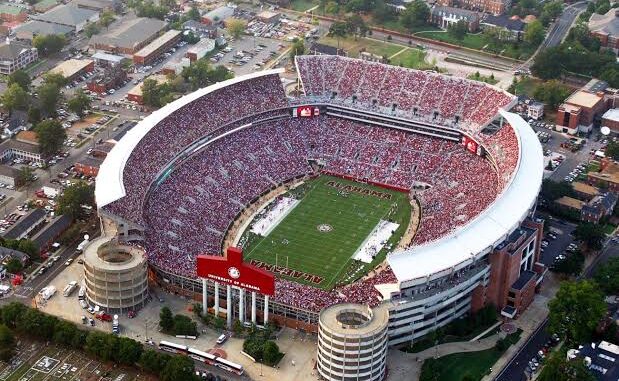
The University of Alabama Board of Trustees has overwhelmingly approved a colossal $175 million “mega-expansion” for Bryant-Denny Stadium. This ambitious project, a cornerstone of the university’s long-term athletic vision, aims to solidify Bryant-Denny’s status as a titan among collegiate venues, potentially making it the largest arena in college football.
While specific, updated capacity figures from this latest $175 million approval are still being finalized, the current plan targets an increase that would push Bryant-Denny well beyond its existing 100,077-seat capacity. This expansion, the latest in a series of significant upgrades since the stadium’s inception in 1929, signals the University’s unwavering commitment to providing a world-class experience for its fervent fanbase and a formidable home-field advantage for the Crimson Tide.
The project is expected to focus on enhancing multiple facets of the stadium experience. While detailed blueprints are yet to be fully released, whispers from inside the athletic department suggest a multi-pronged approach. This includes the addition of thousands of new seats, particularly in areas designed to maximize the raucous atmosphere synonymous with Alabama football.
Premium seating options, including new club levels and luxury suites, are also anticipated to be a significant component of the expansion, catering to the growing demand for exclusive gameday experiences.
Beyond mere capacity, the mega-expansion is also slated to address critical infrastructure improvements. This will likely involve upgraded concourses to improve fan flow, additional restroom and concession facilities to alleviate congestion, and state-of-the-art technology integrations, such as enhanced Wi-Fi connectivity throughout the stadium, a feature that was recently approved for a $13.3 million budget ahead of the 2025 season. These improvements are designed not only to accommodate a larger crowd but also to elevate the overall comfort and convenience for every fan who walks through the stadium gates.
The economic ripple effect of such a massive undertaking is expected to be substantial for Tuscaloosa. Construction phases will undoubtedly create numerous jobs, injecting capital into the local economy. Once completed, the increased capacity will translate to a greater influx of visitors on game days, boosting local businesses ranging from hospitality and retail to transportation. This aligns with past expansions, which have consistently provided a significant economic stimulus to the region.
Bryant-Denny Stadium has a rich history of expansion, steadily growing from its initial 12,000-seat capacity in 1929. Notable expansions in 1998, 2006, and 2010 progressively increased its seating to over 100,000. The most recent significant renovation, completed in 2020 at a cost of $107 million, focused on enhancing club and luxury seating, which slightly decreased the overall capacity from its peak of 101,821. This new $175 million project marks a renewed drive towards maximizing capacity while simultaneously modernizing the fan experience.
While no official timeline for completion has been publicly released following the approval of the $175 million project, similar large-scale stadium expansions typically span several years. Given the scope and scale, it is anticipated that construction will be phased to minimize disruption to football seasons.
The approval of this mega-expansion underscores the University of Alabama’s unwavering commitment to maintaining its position at the forefront of collegiate athletics. For the legions of Crimson Tide faithful, this means more opportunities to witness history unfold in person, while for the city of Tuscaloosa, it signifies a continued boost to its economy and its standing as a premier college football destination. The roar of the crowd at Bryant-Denny is about to get even louder, cementing its legacy as a true colossus of the sport.




Be the first to comment